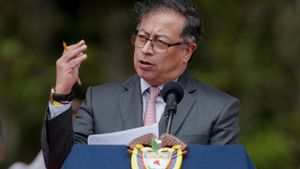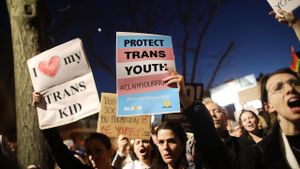The suspension of the U.S. Refugee Admissions Program (USRAP) under President Donald Trump has posed serious challenges for organizations dedicated to refugee resettlement and support. A stark example of this impact can be seen with Journey’s End Refugee Services, which has announced the layoff of about 17% of its staff, translating to 21 jobs lost out of 124. CEO Pamela Bos Kefi stated, "This was not a decision we made lightly. Our team is the heart of our organization, and we are deeply grateful for their dedication and service. We remain committed to our mission and will continue providing necessary support to refugees and immigrant communities."
Bos Kefi expressed concern over potential future cuts due to the uncertainty surrounding funding. "With what appears to be a systematic effort to dismantle the immigration system in the United States, we’re, frankly, anticipating there would be more cuts," she warned. Trump's executive order, signed shortly after his inauguration, effectively halted refugee entries, emphasizing the country’s inability to absorb large numbers of migrants without compromising resources for Americans and ensuring the proper assimilation of refugees. This suspension shifted the financial burden of resettlement onto nonprofits, including Journey’s End. Historically, these organizations rely on federal reimbursements to support refugees transitioning to life in the U.S.
Unfortunately, none were forthcoming following the suspension, leaving many organizations scrambling. According to Bos Kefi, Journey’s End confirmed its commitment to supporting the refugees already present, providing legal services, employment assistance, and educational resources, all with dwindling staff and financial resources. "My goal is to focus on those programs and reinforce them so we can continue to be available to people for years to come," she affirmed, amid expectations of more layoffs.
Another organization, Episcopal Migration Ministries (EMM), also condemned the changes, announcing it would wind down its core operations by February 14, laying off 22 employees as recovery funding ground to halt. Presiding Bishop Sean Rowe described the decision as painful but necessary, predicting it would severely affect the church’s capacity to assist vulnerable communities. EMM has historically played the role of aiding refugees since as early as the 1930s. The halt not only affects EMM but reflects broader changes across multiple faith-based organizations helping refugees. Rowe stressed the church's enduring commitment to aiding migrants, asserting, "An end of federal funding does not mean the end to The Episcopal Church’s commitment to stand with migrants and our congregations who serve them."
Conditions became even dire for the affiliated agencies as they received notification from the Trump administration to cease all work under federal grant agreements. With many organizations like the International Institute of Minnesota reporting canceled flights for hundreds of refugees awaiting resettlement, the operations were severely hampered. "Halting refugee resettlement will keep families living in Minnesota separated from family members abroad waiting to be resettled," cautioned Micaela Schuneman, the director of immigration and refugee services at the Institute.
Further compounding the situation, organizations such as the Center for Victims of Torture were forced to lay off significant portions of their staff due to funding cuts and the loss of federal grants. Scott Roehm, director of global policy and advocacy for the center, expressed disappointment on behalf of those who would no longer receive necessary care. “It is devastating for the organization and staff who have lost their jobs, and most heartbreakingly, for the survivors who were receiving their assistance," he elaborated. Many families are now left uncertain about their futures as Trump’s orders cast doubt on the validity of the refugee program's future.
Among those affected is Kilo Kisongo, whose organization, Voices in the Wilderness, helps resettle Congolese refugees. "We don’t know what our fate is over the next few years, so we are definitely worried," he said. Kisongo highlighted the delays affecting families awaiting arrival and assistance, sharing devastation around the broader impact within the refugee communities.
Political commentary surrounding these changes highlights the spirit against Trump's orders. U.S. Representative Ilhan Omar voiced concerns, stating, “What the President really is doing by creating these crises with his executive orders is he wants to drown the system. He wants us to live in fear. The chaos he wishes to sow ensures his desired results.” Local support for these organizations shows resilience as they continue to advocate for the recently displaced populations. Despite the harsh reality of cutbacks, many nonprofits remain dedicated to offering necessary services, even amid financial strain. Worries over re-integration, asylum processes, and family reunification remain pressing issues on the forefront.
Trump's policies not only affect those directly involved but ripple through communities dependent on diverse populations for economic and cultural contributions. With nationwide protests and advocacy efforts by numerous organizations clamoring for the reinstatement of humane resettlement practices, the dialogue on immigration policy remains heated. For now, many niche grassroots organizations forge on, supporting those who are currently within the system, holding out hope for the future preservation of their work. Time will tell how these changes will shape the U.S. refugee resettlement program and its broader humanitarian commitment.



